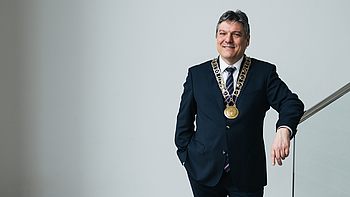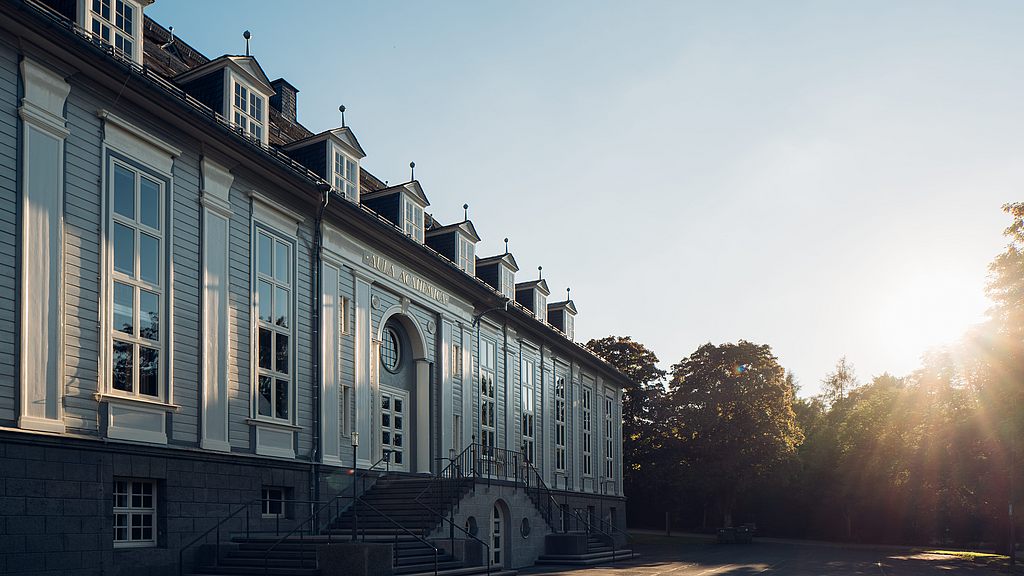About us
Welcome to Clausthal University of Technology
Clausthal University of Technology (CUT) is an internationally renowned institution with strong regional ties. The University has strong traditions of quality education recognized and valued by many national as well as international companies.
Young people enjoy a different and unique way of studying in Clausthal: it is the personal atmosphere and the practice-oriented education that make us distinctive.
Research and education at Clausthal University of Technology are currently focused on Energy and Raw Materials, Natural Science and Materials Science, Economics, Mathematics, Computer Science, Mechanical Engineering and Process Engineering.
In three innovative centers, the Energy Research Center Niedersachsen (EFZN), the Clausthal Centre of Material Technology (CZM) and the Center of Simulation (SWZ), we aim to link applied research in natural science, engineering and economics.
With about 4,100 students and some 1,050 employees, Clausthal University of Technology is one of the most important economic factors in the western Harz Mountains.
The superb worldwide reputation of Clausthal Universityof Technology is regularly reflected in comparative university rankings where CUT enjoys a leading position.
Beyond that, students and employees enjoy the international atmosphere at Clausthal University of Technology, the extensive nature of the Harz Mountains and the over 60 different sports ranging from skiing to sailing and mountain biking offered by the Sports Institute.
Tradition and Innovation
Tradition ...
Thanks to rich deposits of silver, lead, zinc, and copper ores, the Upper Harz Mountain area has been an important mining and smelting centre for centuries. In 1763, Henning Calvör proposed the establishment of a "mathematical school for the most gifted and most capable thinkers among those who wish to become miners and carpenters". Founded in 1775 and elevated to the status of a mining academy in 1864, the Harz Mountain educational institution rapidly achieved an international reputation. Thus, in the mid-19th century, one-half of its students came from North and South America, Southeast Asia, and Australia.
... with changing times
During the sixties of the past century, as coal and steel were losing their dominating position in German industry, the Mining Academy of Clausthal underwent a process of transformation. The introduction of new major courses of study in chemistry, physics, mathematics, mechanical engineering, all the way to process engineering, resulted in structural changes, which in turn justified renaming of the institution as the "Clausthal University of Technology" in 1968. After bridging the gap between tradition and innovation, further pioneering courses of study were offered: During the 1980's, courses were introduced in computer science, technomathematics, and chemical engineering; these have been followed by environmental and power systems engineering, economathematics, computer science in economics, and industrial engineering during the past few years.
Research and education today ...
Research and education at the Clausthal University of Technology are currently concentrated on the materials sciences, mechanical engineering, process engineering, information engineering, as well as studies which expressly combine the economic, natural, and engineering sciences to form a well-balanced qualification profile for new professional fields. With about 90 professors, 400 scientific employees, and some 5,000 students, the Clausthal University of Technology possesses a clear-cut structure, which is well suited for interdisciplinary research.
A European Graduate College in the field of polymers is conducted jointly by the Universities of Göttingen, Amsterdam, Eindhoven, and Clausthal, thus providing an opportunity to perform early research work in an international team. One Sonderforschungsbereich (special field of research), is devoted to metallic materials: "Manufacture from Sheet Metal". One research group is dedicated to the field of "Material-Specific Simulation of Thermal Processes in Production Engineering". The Information Engineering Centre supports the application of computer science in the engineering disciplines. Mathematicians at the Universities of Göttingen and Clausthal cooperate in a research group on number theory. An independent research institute, the Clausthaler Umwelttechnik-Institut (CUTEC), is specialised in the field of environmental engineering and cooperates with the University in teaching and research.
This competency has repeatedly been confirmed by leading positions in rankings which appraise research and education at German universities. With a share of 20 per cent for students and doctoral candidates from foreign countries, the Clausthal University of Technology also occupies a leading position in the international field among German universities.
... practice-oriented
The personal atmosphere for studies, the multitude of university partnerships, the excellent Internet connection in the residence halls, the opportunity to participate in scientific work as a student at the research-oriented Clausthal University of Technology: Features such as these make this school particularly attractive for students. Joint projects between industry and the university demonstrate the special importance placed on applied research, without neglecting basic research.

Professor Dr. rer. nat. Joachim Schachtner
President of Clausthal University of Technology
250 Jahre TU Clausthal
Hier gibt es weitere Informationen zur Jahresfeier
